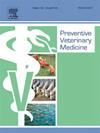Monitoring for classical swine fever virus persistence and seropositivity in vaccinated pig farms using on-farm sentinel pigs during the pre-elimination phase toward a CSF-free status
IF 2.4
2区 农林科学
Q1 VETERINARY SCIENCES
引用次数: 0
Abstract
Classical swine fever (CSF) is a transboundary viral disease that causes high mortality and systemic hemorrhages in domestic pigs and wild boars. In Taiwan, long-term implementation of compulsory vaccination has effectively prevented CSF, with no confirmed cases reported since 2006. On the path toward CSF elimination, a national surveillance program was initiated in 2021 for a two-year period. This program included monitoring unvaccinated on-farm sentinel pigs (with maternally derived antibody but without further vaccination with age) raised on 300 vaccinated farms annually, as well as dead pigs from rendering plants and culled sows from slaughterhouses. Sentinel pigs were sampled twice, at 3–12 weeks and 18–24 weeks of age, and tested for CSFV RNA and neutralizing antibodies (NA). CSFV vaccine strain RNA was detected in eight sentinel pigs from three farms, while all others were CSFV negative. The seropositive rates for anti-CSFV NAs in the first inspection were 68.0 % in 2021 and 70.8 % in 2022, and in the second inspection, they declined significantly to 10.8 % and 9.5 %, respectively. Seropositivity declined with age, indicating MDA waning without new infections. Among 1277 dead pigs and 1199 culled sows tested, tests for wild-type CSFV RNA were negative, while vaccine strain RNA was detected in 1.6 and 2.8 % of dead pigs in 2021 and 2022, respectively. These results suggest that wild-type CSFV persistence is minimal under the current vaccination strategy. Overall, these results demonstrate the significance of the surveillance program, and Taiwan is well-positioned toward CSF elimination.
监测接种猪瘟疫苗的猪场的经典猪瘟病毒持续性和血清阳性反应,在消除猪瘟前阶段使用猪场哨兵猪
经典猪瘟(CSF)是一种跨界病毒性疾病,可导致家猪和野猪的高死亡率和全身性出血。在台湾,长期实施强制性疫苗接种有效地预防了脑脊液,自2006年以来没有报告确诊病例。在消除CSF的道路上,2021年启动了一项为期两年的国家监测计划。该计划包括监测每年在300个接种疫苗的农场饲养的未接种疫苗的农场哨兵猪(带有母源抗体,但没有随年龄进一步接种疫苗),以及来自加工厂的死猪和屠宰场的扑杀母猪。哨兵猪分别在3-12周龄和18-24周龄两次取样,检测猪瘟病毒RNA和中和抗体(NA)。在3个猪场的8头哨岗猪中检测到猪瘟疫苗毒株RNA,而其他所有猪均为猪瘟阴性。第一次检测血清中抗猪瘟病毒抗体阳性率在2021年和2022年分别为68.0% %和70.8% %,第二次检测血清中抗猪瘟病毒抗体阳性率分别显著下降至10.8% %和9.5% %。血清阳性随着年龄的增长而下降,表明在没有新感染的情况下MDA减弱。在1277头死猪和1199头扑杀母猪中,猪瘟野生型RNA检测为阴性,而在2021年和2022年的死猪中分别检测到1.6%和2.8% %的疫苗株RNA。这些结果表明,在目前的疫苗接种策略下,野生型CSFV的持久性很小。总的来说,这些结果证明了监测计划的重要性,台湾在消除脑脊液方面处于有利地位。
本文章由计算机程序翻译,如有差异,请以英文原文为准。
求助全文
约1分钟内获得全文
求助全文
来源期刊

Preventive veterinary medicine
农林科学-兽医学
CiteScore
5.60
自引率
7.70%
发文量
184
审稿时长
3 months
期刊介绍:
Preventive Veterinary Medicine is one of the leading international resources for scientific reports on animal health programs and preventive veterinary medicine. The journal follows the guidelines for standardizing and strengthening the reporting of biomedical research which are available from the CONSORT, MOOSE, PRISMA, REFLECT, STARD, and STROBE statements. The journal focuses on:
Epidemiology of health events relevant to domestic and wild animals;
Economic impacts of epidemic and endemic animal and zoonotic diseases;
Latest methods and approaches in veterinary epidemiology;
Disease and infection control or eradication measures;
The "One Health" concept and the relationships between veterinary medicine, human health, animal-production systems, and the environment;
Development of new techniques in surveillance systems and diagnosis;
Evaluation and control of diseases in animal populations.
 求助内容:
求助内容: 应助结果提醒方式:
应助结果提醒方式:


